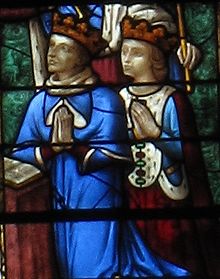Janus I de Lusignan
| Janus | |
|---|---|

King Janus and Queen Charlotte in Chartres cathedral
|
|
| King of Cyprus | |
| Reign | 9 September 1398 - 29 June 1432 |
| Predecessor | James I |
| Successor | John II |
| Born | 1375 Genoa |
| Died |
29 June 1432 Nicosia |
| Spouse | Anglesia Visconti Charlotte de Bourbon |
| Issue |
John II of Cyprus Anne of Cyprus |
| House | Poitiers-Lusignan |
| Father | James I of Cyprus |
| Mother | Helvis of Brunswick-Grubenhagen |
Janus of Cyprus (1375 – 29 June 1432) was a King of Cyprus and titular King of Armenian Cilicia and Jerusalem from 1398 to 1432.
Janus was born in Genoa, where his father, James I of Cyprus, was a captive. His mother, Helvis of Brunswick-Grubenhagen, named him in honor of the god Janus, the founder of Genoa according to mythological tradition.
When his father was elected king, he negotiated an agreement with the Genoese to release him to go to Cyprus, which he signed on 2 February 1383. Under that agreement, the Genoese were given new commercial privileges. However, the Genoese demanded that his father leave his son Janus in their city as a hostage. James sent a noble to Genoa, John Babin, to act as stepfather to his son. As the Cypriot historian Leontios Makhairas writes, James ordered a special tax which required the Cypriots—both nobles and commoners—to purchase an amount of salt in order to collect the money needed to release his son from Genoese captivity; this was achieved on October 1392, when Janus was 18 years old.
After his father's death on 9 September 1398, Janus took over the throne of Cyprus. He was crowned in Nicosia's Saint Sophia Cathedral on 11 November 1398.
As king he tried in 1402 to take back Famagusta, which was under Genoese rule. According to writings of Amati, the administrator of Famagusta, the Genoese Antonio de Karko, was Janus' godfather. Janus conspired with a priest who was the spiritual father of de Karko, in order to return the city to the Cypriot kingdom, upon which the priest was to become Bishop of Famagusta. Involved in that conspiracy was Peter Makhairas, brother of Leontios. They made secret keys to the city gates and there were many preparations to take over Famagusta and to murder de Karko with the help of Brother Gregory and to open the gates for Janus' soldiers. However, at the last moment the plan was betrayed, and the conspirators were arrested at Famagusta; 28 of them were executed and the city remained in Genoese hands.
The king continued his effort to take back Famagusta (whose territory also included Kyrenia). In 1403, the governor of Genoa, Jean Le Maingre, had talks with Janus' representative Giorgio Billi which ended in an agreement by which the cities remained under Genoese hands. Later, he forced the Cypriot people to pay special taxes to assemble an army and siege machines, and he besieged Famagusta for three years but in vain, since there was access from the sea to the city. In 1406 the siege ended and the Genoese tried to occupy Limassol, but were defeated.
...
Wikipedia
